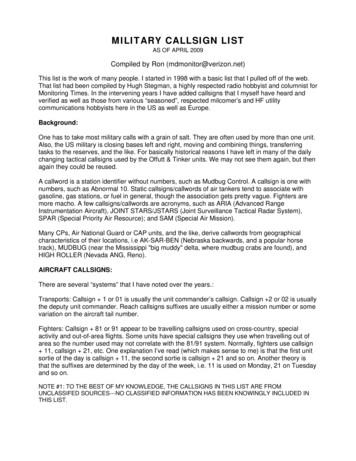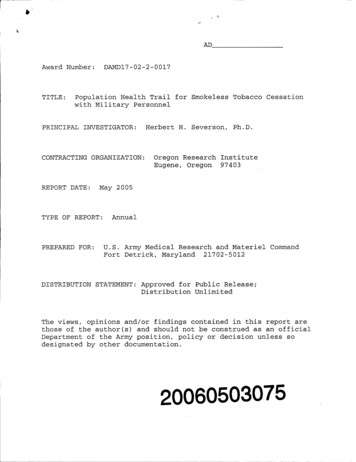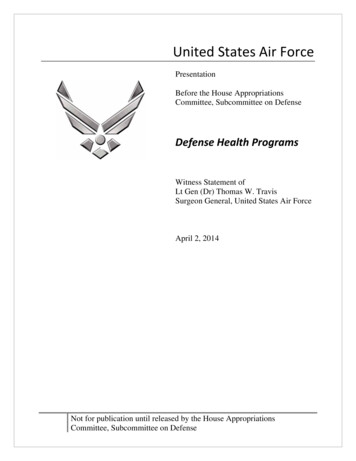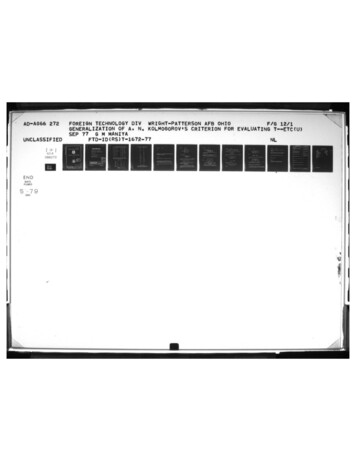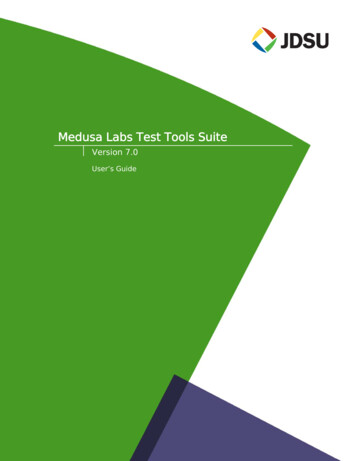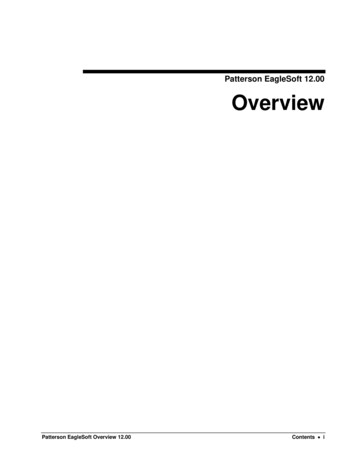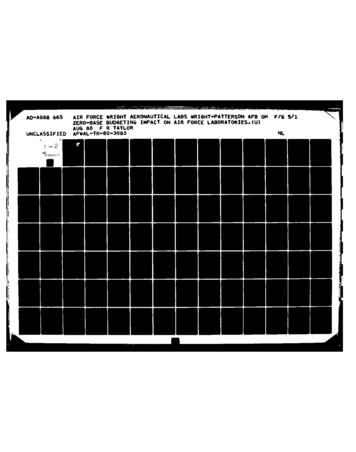
Transcription
AD-AG88 665UNCLASSIFIEDAIR FORCE WRIGHT AERONAUTICAL LABS WRIGHT-PATTERSON AFB OHZERO-BASE BUDGETING IMPACT ON AIR FORCE LABORATORIES.(U)AUG 80 F R TAYLORAFWAL-TR-80-30B3FIG IIIEIIEE
11811I.25TillETij8
AFWAL-TR-80-3083.eIiZERO-BASE BUDGETING IMPACT ONAIR FORCE LABORATORIESFREDERICKR. TA YLORCONTROL SYSTEMS DEVELOPMENT BRANCHFLIGHTCONTROL DIVISIONAUGUST 1980TECHNICAL REPORT AFWAL-TR-80-3083Approved for public release; distribution unlimited.C)C-)FLIGHT DYNAMICS LABORATORYAIR FORCE WRIGHT AERONAUTICAL LABORATORIESLLIAIR FORCE SYSrEMS COMMANDJAWRIGHT.PATTERSON AIR FORCE BASE, OHIO 4543380 8 25 322
NOTICEhrhen Government drawings, specifications, or ocher data are used for any purposeother than in connection with a definitely related Government procurement operation,the United States Government thereby incurs no responsibility nor ank obligationwhatsoever; and the fact that the government may have formulated, furnished, or inany way supplied the said drawings, specifications, or other data, is not to be regarded by implication or otherwise as in any manner licensing the holder or anyother person or corporation, or conveying any rights or permission to manufactureuse, or sell any patented invention that may in any way be related thereto.This report has been reviewed by the Office of Public Affairs (ASDIPA) and isreleasable to the National Technical Information Service (NTIS). At NTIS, it willbe available to the general public, including foreign nations.This technical report has been reviewed and is approved for publication.FREDERICK R. TAYLOREVARD H. FLINN, ChiefAuthorControl Systems Development BranchFlight Control DivisionFOR THE COMMANDERMORRIS A. OSTGAARDAssistant for Research andTechnologyFlight Control DivisionCopies of this report should not be returned unless return is required by securityconsiderations, contractual obligations, or notice on a specific document.AIR FORCE/k78O/1 4 August 1900 - 100
UNCLASSIFIEDSECURITY CLASSIFICATION OF THIS PAGE (W7hen Det.Entered)REPORT DOCUMENTATION PAGEREAD INSTRUCTIONSBEFORE COMPLETING FORM2. GOVT ACCESSION NO.AAFNAL-TR-8W-3d83J-3. RECIPIENTS.A g5/? fYP0-ffEPORT &PERIOD6ERO-JBASE WJDGTN.---.LABORATORIE-RFORMING CoRG. REPO---7.IV E"f23 Aug 7916 May 6SAIR.-.-Thesis,ON-.AUTHOR a)T NUMBERCONTRACT OR GRANT NUMBER(s)8.Frederick R. Taylor !10. PROGRAM ELEMENT, PROJECT. TASKPERXORMING ORGANIZATION NAME AND ADDRESS9.AREA & WORK UNIT NUMBERSAir Force Wright Aeronautical LaboratoriesAir Force Systems CommandWright-Patterson AFB, Ohio.,.Air Force Fellowship4543311. CONTROLLING OFFICE NAME AND ADDRESS4 eeR *Flight Dynamics Laboratory (FIGLA)Wright-Patterson AFB, Ohio14.*80&Air Force Wright Aeronautical LaboratoriesHIUIR OF.16645433MONITORING AGENCY NAME & ADDRESS(If different from ControllinA Office)-AGES- ,/,-15. SECURITY CLASS. "oi'Mi)-fWV4'1TUnclassifiedIS.DECLASSIFICATION DOWNGRADINGSCHEDULE16. DISTRIBUTION STATEMENT (of this Report)Approved for public release; distribution is unlimited.'7. DISTRIBUTIONSTATEMENT (of the abstracf entered In Block 20, if different from Report)18. SUPPLEMENTARY NOTESKEY WORDS (Continue on reverse side if necessary and identify by block number)lqZero-Base Budgeting (ZBB)BudgetingAir Force R&D LaboratoriesMB(2PPBSSunset LawsArmy R&D LaboratoriesNavy R&D LaboratoriesMiddle ManagementABSTRACT (Continue on reverse aide If neceasary and identity Sv block number)his research study is devoted to an examination of operational budgetingexperiences in Air Force Research and Development Organizations. The specificobjective was to investigate the lessons learned from the successcs orfailures of prior budgeting concepts to derive insights that could be used toimprove the effectiveness of budgeting and administration in the Air Force.The study focuses on middle management's operational experiences with pastand current budgeting concepts. The study concludes that Zero-Base BudgetingDD IJ1473EDITION OF I NOV 65 IS OBSOL'TEUNCLASSIFIEDSECURITY CLASSIFICATION OF THIS PAGE (Whentr).Entered)
UNCLASSIFIEDSECURITY CLASSIFICATION OF THIS PAGE(Wh.Datarntemd)is working very effectively in Air Force research and development organizations,but not necessarily as advertised to the public as a concept to provide substantial reductions in government spending. The basic finding is that neitherZero-Base nor any other budgeting concept can impact no more than approximatelytwenty-five percent (25%) of the Federal budget, because roughly seventy-five(75%) is committed to permanent allocations such as social security, pensionsand debt interest. Recommendations are made concerning the positive aspectsof mangement involvement, feedback and communication between hierarchial levelsas instruments of morale building and leadership development. The findingsand recommendations of this study provide insights that can be beneficial inimproving the effectiveness of budgeting and administration of Air Forceresearch and development managementKJTNfT.A.TFT F.DStCURITY CLASSIFICATION OF THIS PAGE(When Datanflewed)
PREFACEThis report comprises a research thesis by Mr. Frederick R. Taylorduring the period 23 August 1979 through 16 May 1980 as partial fulfillment of the requirements for the degree of Master of Arts in PublicAdministration from The University of New Mexico under the FellowshipProgram for Advanced Study in Public Science Policy and Administration.Mr. Taylor of the Air Force Wright Aeronautical Laboratories, FlightDynamics Laboratory, Flight Control Division, Control System DevelopmentBranch, Control Techniques Group, was sponsored as an Air Force Fellow.He has a BS in Electrical Engineering from Tennessee State A&I University(1960).The author is indebted to the Thesis Committee, Dr. Albert H.Rosenthal, Chairman, Dr. Ferrel Heady and Professor Frank Kleinhenz,all of New Mexico University Public Administration Department. Speoi:lcontributions were also made by Messrs. Bob Tolliven and Ted Clements ofthe Air Force Weapons Laboratory. Assistance was provided by Mr. JamesHodges, Flight Dynamics Laboratory, Vehicle Equipment Division.The study examined the impact of Zero-Base Budgeting and prior budgeting concepts on Air Force R&D Laboratories. The research concludesthat lessons learned from previous experiences with budgeting systemshave been used by management. Findings and recommendations of thisstudy provide insights that can be beneficial in improving the effectiveness of budgeting and administration of Air Force research and development management.7 ii
TABLE OF CONTENTSLIST OFTABLES.O.P.vii.0.CHAPTERI.METHODOLOGY AND SCOPE.1Statement of .7Historical Perspective.Organization of this Study. .II.81316PLANNING, PROGRAMMING AND BUDGETING SYSTEM .The Emergence of PPBS. .Description of PPBS. . .1818.The General PPBS Approach.Planning, Programming BudgetingSystem in DOD. . .*.PPBS in Other Government Agencies.PPBS in Industry.PPB in Other Governments.202324283030.31MANAGEMENT BY OBJECTIVES IN THE AIR FORCE .36Summary . .00III.556.Significance of the Study.Endnotes.2ee oIntroduction.0.0 .Management Needs of the Air Force.MBO Background.,.MBO Description. .MBO in Business. .MBO in Government.00. 0.0.363738404243MBO Process in the Department of Defense.Air Force's Role in MBO. .Problems in Air Force Implementation4648of MBO.*.Summary.Endnotes. .VI.pan. . .0. 505255V
IV.ZERO-BASE BUDGETING AND SUNSET LEGISLATION57Introduction .Zero-Base Budgeting . .ZBB Description .The Conceptual Process.ZBB in DOD (Department of Defense) .Lessons Learned from Zero-Base Budgeting.Sunset Legislation . .57Historical Background.Sunset in State Government.7678Sunset in New Mexico. . .00000000000000. 00000990000.Sunset in Texas .4060904000049.Sunset in Colorado .788282o.Legislation . . . . .Argumentsfor and AgainstSunseto.o.Legislation.,.8588Endnotes .96Sunset in OtherStates.Federal Sunset and Program Review58606165707684::::::::::::::::::::::::::: 9Su mr.V.INTERVIEW ANALYSIS . .Introduction . . .000049999Interview Population/Responses. 101Tabulation of Interview Results. 104107Analysis of Interview Results.Comparisons of Zero-Base Budgeting in117Services. .the Three000117.SummaryEndnotes.VI.122 .Summary. .Conclusions.Specific Conclusions.Recommendations.,.Enntes. .122126131135137.APPENDIX A.APPENDIXL120CONCLUSIONS AND RECOM0ENDATIONS .SELECTED BIBLIOGRAPHY. .150Vi.[138145"
LIST OF TABLESTablePage1.Organizations Contacted.2.Summary of Interview Responses (Zero-BaseBudgeting Interview Schedule).,. .vii102106
CHAPTER IMETHODOLOGY AND SCOPErStatement of ProblemThe Federal government has been under pressure fromthe public to increasr efficiency and effectiveness of thegovernmental system.A number of budgeting concepts as re-forms have been tried with limited success in the past.President Carter in 1977 introduced a new type of budgetingto the Federal government, Zero-Base Budgeting (ZBB), whichhe used as Governor of the State of Georgia.There is noquestion that Zero-Base Budgeting is a viable concept forpublic agencies, since it has been used with some successby local governments and by private business.Recent budgeting or managerial concepts such asPlanning, Programming and Budgeting and Management byObjective were hampered in their implementation, not bytheir functional mechanics, but, by other factors.Thisthesis is concerned with examining the experiences andlessons learned from the success or failure of prior budgeting concepts to derive insights that can improve theeffectiveness and responsiveness of ZBB's implementationin DOD from the middle management perspective, therebyimproving their policy making capabilities.1
BackgroundThere are four major purposes fulfilled by budgets.First, budgets are used as a device in making and coordinating short range plans.inBudgets communicate these plansa consistent and uniform manner to those managers whoare responsible for carrying them out.Thirdly, budgetsare useful as standards against which actual performanceLastly, budgets can be usedcan be subsequently compared.to motivate managers at all levels in the organizationalstructure.1There are many different ways to define ordescribe a budget but Lynn and Freeman describe a budget asa financial plan and, in terms of this country,."themost significant policy statement made by the Federal government is the annual adoption of the budget."2The concept of budgeting or resource allocation inscarcity has been around since biblical times, and perhapsbefore.Some of the initial concerns were primarily toprevent waste and misuse; however the modern day trend inbudgeting does not concentrate on misuse (individual) butis highly concerned with reducing waste through efficiencyand effectiveness.In this country, budgeting followedsomewhat the European concepts and until the early 1900swas described by one author as . . . "an instrument ofcontrol over the officers . . . of administration by plac-ing limitations on their authority to spend." 3During the twentieth century, the Federal budgetingprocess has undergone progressive changes or reforms that2
altered the planning-management-control balance of publicadministration.4Following this trend, there have beenthree significant budget reform stages starting with theBudgeting Accounting Act of 1921, which increased the presidential power in the budgeting process.The 1930's broughton the New Deal and the introduction of the managementapproach which culminated inbudgeting in the 1950's.the performance or programIn an attempt to provide a formalsystematic method to improve decisions in the budgetaryprocess, Planning, Programming and Budgeting was Introducedas the third budget reform stage.There have been other managerial or budgetary concepts during the 1970's aimed at improving the decisionmaking-budgetary process.Management by Objectives wasin use for a short period, but has been replaced since 1977by a new budgetaryconcept, Zero-Base Budgeting.The dichotomy of increasing inflation and resourcescarcity pitted against increasing public expectations haschanged the generalized perception of the Federal bureaucracy.President Carter recognized the change in thepolitical mood from promising more to government providingmore efficiency; therefore, on February 14, 1977, he Issuedan order establishing Zero-Base Budgeting throughout theFederal government.He noted that:"An effective Zero-Base Budgeting system will benefit theFederal government in several ways.3It will:
Focus the budget process on a comprehensiveanalysis of objectives and needs.Combine planning and budgeting into a singleprocess.Cause managers to evaluate in detail thecost-effectiveness of their operations.Expand management participation in planningand budgeting at all levels of Federal government . * .By working together under a Zero-Base Budgeting system, wecan reduce costs and make the Federal government more efficient and effective .,,5Zero-Base Budgeting was implemented in the Departmentof Defense (DOD) in 1977.An examination of lessons learnedand applied is the basis for this thesis.The thesis willalso explore the implications of a new legislative act,'Sunset Law."This law would require that Congress reviewall authorizations of Federal programs and terminate themover a four to six year period unless they are reenactedand that all Federal programs undergo Zero-Base review(i.e., program evaluation) before they could be reauthorizedor reenacted. 6The effect of either ZBB or Sunset on thetotal Federal budget is limited, since approximately 75percent of the budget includes permanent authorizationssuch as social security, retirements, and interest on thedebt that would be unaffected by either concept.4
FScopeThe research for this study encompasses a reviewof books, journals and periodicals written by authorities;extensive review of government documentation relative tothe implementation of budgeting concepts, in particularZero-Base Budgeting; and an interview evaluation of AirForce middle management experiences with the implementation of Zero-Base Budgeting.This study is focused onmiddle management in research and development organizations.Middle management as used herein refers to Air Force SystemsCommand laboratory commanders or chiefs.This derivationis based on the definition of middle managers by Golembiewskiin his book, Managerial Behavior and Organizations, whichis "Managing by Hundreds:Dynamics.Middle Management and Department,,7HypothesisIt is hypothesized that "lessons andinsightslearned from prior applications of Zero-Base and other budgeting concepts are being used to improve the effectivenessof budgeting and administrationin Air Force Research andDevelopment Laboratories."ObjectivesThe specific objective of this thesis is to examinethe experiences encountered with the "successes or failures"of prior budgeting concept applications to derive insightsthat can improve the effectiveness of Zero-Base Budgeting's5
implementation in DOD from middle management's perspective.The study has five sub-objectives that can be achieved byanswering the following questions:1. What lessons were learned from other budgetingconcepts and are they being applied to budgetingin Air Force laboratories?2. What insights were gained from prior applications of Zero-Base Budgeting in other domains(public and private sectors) and are they beingapplied in the Air Force?3. Is Zero-Base Budgeting being substituted forthe political process or management judgements?4. In view of Sunset Legislation, should Zero-BaseBudgeting be applied yearly as currently done,or every five or six years?5. What are the implications of Zero-Base Budgetingto middle level R&D management in the Air Force?MethodologyThe basic techniques are a literature review and aninterview evaluation.The extensive literature review ofauthoritative sources and government documents does provide the background setting and insights for the evaluation.The structured interviews provided up-to-date experiencesof ZBB in DOD during the past two budgeting cycles andalsonotedsome legislative perspectives of Sunset implica-tions.6
The focus of this study is tailored toward middlemanagement in R&D organizations.While they are not inpolicy making positions, their reflections and inputs canenhance the upward flow of meaningful information to thepolicy-decision making hierarchy. The concern is to improvethe communication and effectiveness of the total budgetingplanning process.Significance of the StudyThe significance of this study is to provide insights from prior experiences that can improve the effectiveness and responsiveness of the DOD budgeting process.Since ZBB is a bottom-up process, the author's view isthat improving the lower or middle management step in theprocess will translate into overall implementation improvements.However, insights or lessons surfaced in the studyare in no way closeended and can be transferred upwardsto higher levels.The perspective of a need for improved budgetaryefficiency is dictated by this era of growing inflation,increased emphasis on domestic programs and diminishinginterest (public and Congressional) in national defense.This makes the Job of fiscal management significantly moredifficult for DOD which is perhaps one of the world'slargest businesses in terms of dollars.Standard andPoor's Register in 1976 noted that DOD's annual budgetwas over three times larger than General Motors at 317
billion.8As one public official said at that time, DOD'sfinancial status is highly visible, especially by the "havenots" of this country, and we should make doubly sure that9waste is removed from each and every pocket.To set the stage for this study, it may be well toreview in an historical sense the evolution of budgeting,what it is and how this country and DOD have arrived at thepresent budgeting concept, Zero-Base Budgeting.Historical PerspectiveThere is no single definition which could adequatelydescribe the unduly complex function and purpose of budgeting.Originally our Federal budget served somewhat as an accounting function, with the primary purpose being that of controlling expenditures for efficiency.One formal definitionis that the purpose of budgeting is to coordinate a planwhich will insure that resources will be utilized in an efficient manner to accomplish an established goal. 0 The planshould be time s coped and include consideration of the availability of resources with references to priortization.The Federal budget, as discussed herein, is an expression of an interrelated complex of decisions designedto accomplish various purposes.Lynn and Freeman see thebudget as a plan of financial operation embodying an estimate or proposed expenditures for a given period andproposed means of financing them.theUsed without any modi-84.J
fier, the term usually indicates a financial plan for asingle year. 1 1Since the establishment of this country and theConstitution, there were provisions for budgetary procedures by the executive and legislative agencies.Almost fromduring the twentieth century,the beginning and especiallythere has been a continuous effort to improve the budgetingprocess.These improvement efforts are known as budgetreforms.The three most notable reforms,since the early1920's, were the Budget Accounting Act of 1921, the New Dealperformance budgeting initiatives of the 1930's and 1940'sand later the Planning Programming Budgeting System (PPBS)of the 1960's.There have been other budgetary reforms sincedirected at examining their usethe 1960's but this paper isin the Federal government, more specifically the Departmentof Defense.No one can establish definitely when the concept ofbegan.budgeting or resource allocation in scarcityThereare biblical references to tax collections in ancientBabylonia, Assyria and in Egypt under the Pharaohs, i.e.references to Joseph the Provider. 1 2Some of the major con-cerns of budgeting have been the controlling resources so asto prevent waste, overspending and not least of all, misuses.History is replete with accounts of punishments for dishonesty.This surfaced during the Puritan Revolution in England,wherein London merchants were suspicious of the management of9.l iltn n.--'. ."-""q
resources by the parliamentary committees and voiced theircomplaints in the following manner:having arranged the receipts andrevenues . . . so disorderly and ineffectually that the Kingdom cannot but beunsatisfied concerning the due employmentthereof and doubt that much of the publicmoney hath been employed to private endsand remains obscured in the hands of suchas were intrustedlihe collection of thoseassessments . . 1Over the years and into the eighteenth century, thetrend by European governments was to place professionalsinto roles of handling the treasury and the emphasis was nolongeron misuse by individuals but economy.This country,in setting up its Constitution, adopted this policy.There-fore, the trend in budgetary practices in America, sincethe late nineteenth century to this date, has been towarddeveloping and utilizing administrative technology for efficiency. Most of the basis for improvements and budgetaryreforms have been directed toward achieving a given objective at least cost or getting the most of a given objective14out of a stated sum of money.James W. Davis, Jr. explains that every reformalters the planning-management-control balance of publicadministration, sometimes inadvertently, usually deliberately.1 5In reviewing the Federal budgetary process duringthis century, through the early 1970's, there are threeidentifiable successive stagesof budget reform.The firstreform stage was roughly from 1920 to 1933 wherein emphasiswas placed on developing adequate expenditure controls to10lOA
combat beginning budget deficits.This led to the BudgetingAccounting Act of 1921, which created the Bureau of theBudget and the General Accounting Office. But,more importantly, it strengthened the president's participation in andinfluence of the planning and preparation of the budget.The second budget reform stage was from the early1930's, Roosevelt's Administration through the 1950's, withthe introduction of the management approach to budgeting,beginning with the New Deal.The management emphasis madeits mark in the reform of the appropriation structure,development of management improvements and work measurement programs (Full Employment Act of 1946) and the focusing of budget preparation on the work activities of theagencies (Budget Accounting and Procedures Act of 1950, resulting from the Hoover Commission).With the urging ofthe first Hoover Commission (included studying the Federalbudget process), performance or program budgeting was initially used in President Truman's budget in 1950.16Anobject-of-expenditure format was still being used andindividual item justifications were missing.Also, budgetestimates were being compiled incrementally, which essen-tially piggybacked on previous year's expenditures plusincreases or decreases, as warranted.The third budget reform stage inFederal budgetingwas the introduction of the Planning, Programming and Budgeting (PPB) concept to the Department of Defense in111964.PPB
is a management system used by the Johnson Administrationin an attempt to provide a formal systematic method toimprove decisions concerning allocation of resources,1 7Thisconcept was popularized by the Secretary of Defense, RobertMcNamara,but was extended by President Johnson to the wholegovernment.It later spread to state and local governments,as well as to governments throughout the world.PPBS was not accepted by the governmental bureaucracy and was replaced by the Nixon Administration inby Management by Objectives (MBO).1973This concept was lessformalized and structured than PPBS, but it also failed togain full acceptance by the executive agencies.Many reasonswere given for its lack of acceptance including the domination form of control, political and administration problems and the difficulty in translating agency missions intoactual operational plans. 1 8Peter Drucker, speaking earlierto the problems of harmonizing the personal goals of middlemanagement with organizational goals when using the domination form of control, perhaps summarizes the primary reasonthat MBO failed:Control is an ambiguous word.It meansthe ability to direct oneself and one'swork. It can also mean domination of oneperson by another . . . managementobjectives are the basis of control inthe first sense; but they must neverbecome the basis of control in thesecond, for this would defeat theirpurposes. Indeed one of the majorcontributions of management by objectives is that it enables us to substitute management by self control formanagement by domination.' 912
Some of the characteristics of both PPBS and MBOproved effective and were later surfaced in Zero-Base Budget-Ing as introduced by President Carter in 1977.ZBB was firstattempted in the Department of Agriculture in the early1960's.20tinued.It proved impractical at that time and was disconZBB later surfaced, somethink originated, at TexasInstruments, having been introduced by Peter Phyrr in 1968.21Jimmy Carter, then Governor of Georgia, obtained Phyrr'sassistance in implementing it in Georgia and he later implemented it in the Federal government upon his inauguration asPresident in 1977.Organization of this StudyThe study is arranged to review the governmentalexperience with past budgeting concepts; to take a closerlook at the current experience with Zero-Base Budgeting andlegislative initiatives; and finally, to assess and drawconclusions from an interview of Air Force middle managersbased on operational experiences.Chapter II examines theoperational history of Planning, Programming and BudgetingSystem (PPBS) in the Department of Defense (DOD).Specificemphasis is placed on identifying lessons learned from theseexperiences that may benefit DOD management in the implementation of current and future budgeting or managerial concepts.Critics differ on whether or not PPBS was a successor failure in DOD; however, the intent of this study is notto evaluate the success ratio but to explore actual experi-13
ences that can be beneficial to Air Force management.Chapter III examines the operational experiences ofManagement by Objectives (MBO) in both the public and private sectors.MBO was introduced to the Federal governmentin 1973 as a replacement for PPBS (Planning, Programmingand Budgeting System) but was aborted shortly after it wasintroduced due to political changes at the executive level.This chapter examines some of the reasons for MBO's demiseand discusses some of the special features of MBO that arebeing used by some Air Force laboratories as participativemanagement approaches to employee evaluations.Chapter IV is a combined investigation of Zero-BaseBudgeting and Sunset Legislation.Zero-Base Budgeting wasintroduced to all Federal agencies in 1977 and "SunsetLegislation" or "Sunset Laws" have been debated in the pastthree Congressional sessions, but have not been enactedat the Federal level.The degree of success of Zero-BaseBudgeting in the DOD, specifically in the Air Force Laboratories, is examined in view of past experiences with thisand other budgeting concepts in both public and privatesectors.The implications of Sunset Laws on Zero-Base Bud-geting in the government is explored to determine possibleeffects on the Federal budgeting process.Chapter V is a correlation and analysis of the interview covering first hand experiences of middle managers inAir Force Research and Development Laboratories.The evalua-tive focus is on the impacts and implications of Zero-Base14[
Budgeting and other budgeting systems to middle management.In Chapter VI, conclusions and recommendations arepresented on the impacts, implications andinsights ofZero-Base Budgeting in the Air Force Laboratories.Thisbudgeting concept appears to have been fairly successful inthe Air Force and It is hoped that any insights presentedin the study will improve the effectiveness and human aspectsof its continued implementation.15v
Chapter I Endnoteswood:iRobert N. Anthony, Management Accounting (HomeRichard D. Irving, Inc., 1970), p, 150.2Edward S. Lynn and Robert J. Freeman, FundAccounting:7n ., 1974), Theoryp. 282.Iand Practice (New York: PreT ce-Hall,3Selwyn W. Becker and David Green, Jr., "Budgetingand Employee Behavior," Accounting and its BehavioralImplications (New York: McGraw-Hill, 1969): 522.4 James W. Davis, Jr., ed., Politics, Programs andBudgets: A Reader in Government Budgeting (EnglewoodCliffs: Prentice-Hall, 1969), p. 27.'President Jimmy Carter, "Memorandum for the Headsof Executive Depar
AD-AG88 665 AIR FORCE WRIGHT AERONAUTICAL LABS WRIGHT-PATTERSON AFB OH FIG 3/1 . He has a BS in Electrical Engineering from Tennessee State A&I University (1960). The author is indebted to the Thesis Committee, Dr. Albert H. . Budgeting Accounting Act of 1921, which increased the presi-dential power in the budgeting process. The 1930's brought
